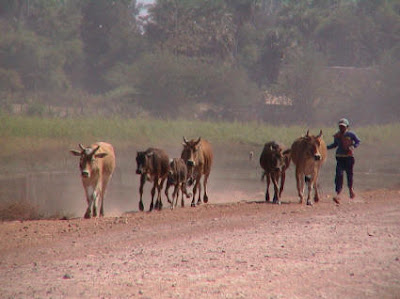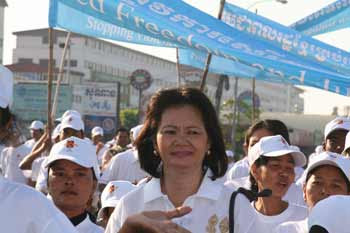Posted on 4 September 2009
The Mirror, Vol. 13, No. 628
“Phnom Penh: In Soklyda, known to have had a relation with former Military Police brigadier general, Ms. Chea Ratha, participated in a press conference organized by the Cambodian League for the Promotion and Defense of Human Rights (LICADHO).
“In the evening of 2 September 2009, LICADHO held a press conference at its headquarters with Ms. In Soklyda, Ms. Ya Soknim [her aunt], and her mother, where the three of them recounted in detail events related to the previous acid attack against Ms. In Soklyda’s aunt, Ms. Ya Soknim, and they accused Ms. Chea Ratha to be the person responsible for the attack.
“Ms. In Soklyda said, in between sobs, that Ms. Chea Ratha is a person involved in many previous cases of acid attacks including against [CTN commentator] Mr. Tith Polen and against her aunt, Ms. Ya Soknim.
“She added that there is much evidence to prove that Ms. Chea Ratha was involved in those cases, including voice recordings of phone calls; however, the court had decided to drop the charges against her, due to a lack of evidence. In the meantime, Ms. In Soklyda expressed concers about her own safety when Ms. Chea Ratha is now freed from charges and can return home.
“Ms. In Soklyda’s aunt, Ms Ya Soknim, who is the victim of an acid attack, said in the conference that she is worried about her safety, after the court had decided to drop the charges against Ms. Chea Ratha.
“Also, both Ms. In Soklyda and Ms. Ya Soknim, asked for intervention by the Prime Minister of the Kingdom of Cambodia, Samdech Akkak Moha Senapadei Dekchor Hun Sen, over this case, and called for support to offer her asylum.
“Kampuchea Thmey could not reach Ms. Chea Ratha for comment in the evening of 2 September 2009, but her lawyer, Mr. Keo Ya, had claimed that his client was not involved in that acid attack, and that she can return back [to Cambodia] soon. Also, Mr. Keo Ya hopes that the Royal Government will offer the position of Military Police brigadier general back to his client.
“The president of the Phnom Penh Municipal Court, Mr. Chiv Keng, could not be reached for comment by phone in the evening of 2 September 2009.
“Regarding the announcement of the verdict by the Municipal Court, Ms. In Soklyda, LICADHO, and the Cambodian Center for Human Rights, released a joint statement in the evening of 2 September 2009, calling the decision to drop the charges against Ms. Chea Ratha and her accomplices a display of impunity in the Kingdom of Cambodia.
“It should be remembered that on 21 August 2009, the Phnom Penh Municipal Court announced to lift the accusations against seven suspects involved in the acid attack against Ms. In Soklyda’s aunt, claiming that there was insufficient evidence to put the burden on them.
“After Ms. In Soklyda’s aunt had been attacked with acid, the authorities had arrested two people for involvement in the attack and they said that Ms. Chea Ratha was the most important person of this case. After that, Interpol had issued a red warrant in 180 countries to arrest Ms. Chea Ratha.
“Since then, Ms. Chea Ratha has hidden herself, and recently, after the court decided to drop charges against her, a news source said that she will return home soon.”
Kampuchea Thmey, Vol.8,#20,.9.2009
Newspapers Appearing on the Newsstand:
Thursday, 3 September 2009















 Photo by: Tracey Shelton
Photo by: Tracey Shelton Koh Pich´s skyscrapers are soon to be completed
Koh Pich´s skyscrapers are soon to be completed http://www.dap-news.com
http://www.dap-news.com Photo by: Tracey Shelton
Photo by: Tracey Shelton Photo by: Tracey Shelton
Photo by: Tracey Shelton Photo by: Heng Chivoan
Photo by: Heng Chivoan Photo by: AFP
Photo by: AFP Photo by: Thun Sophea
Photo by: Thun Sophea Photo by: TRACEY SHELTON
Photo by: TRACEY SHELTON Photo by: Sovan Philong
Photo by: Sovan Philong Photo by: ROBERT STARKWEATHER
Photo by: ROBERT STARKWEATHER Four of the six trophies made by the Armed Art project, one of which will be given to the winner of the 2009 CNVLD tournament. CNVLD
Four of the six trophies made by the Armed Art project, one of which will be given to the winner of the 2009 CNVLD tournament. CNVLD